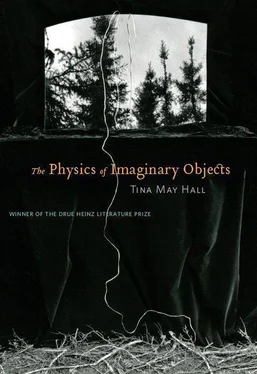Tina Hal - The Physics of Imaginary Objects
Здесь есть возможность читать онлайн «Tina Hal - The Physics of Imaginary Objects» весь текст электронной книги совершенно бесплатно (целиком полную версию без сокращений). В некоторых случаях можно слушать аудио, скачать через торрент в формате fb2 и присутствует краткое содержание. Год выпуска: 2010, Издательство: University of Pittsburgh Press, Жанр: Современная проза, на английском языке. Описание произведения, (предисловие) а так же отзывы посетителей доступны на портале библиотеки ЛибКат.
- Название:The Physics of Imaginary Objects
- Автор:
- Издательство:University of Pittsburgh Press
- Жанр:
- Год:2010
- ISBN:нет данных
- Рейтинг книги:5 / 5. Голосов: 1
-
Избранное:Добавить в избранное
- Отзывы:
-
Ваша оценка:
- 100
- 1
- 2
- 3
- 4
- 5
The Physics of Imaginary Objects: краткое содержание, описание и аннотация
Предлагаем к чтению аннотацию, описание, краткое содержание или предисловие (зависит от того, что написал сам автор книги «The Physics of Imaginary Objects»). Если вы не нашли необходимую информацию о книге — напишите в комментариях, мы постараемся отыскать её.
The Physics of Imaginary Objects,
The Physics of Imaginary Objects — читать онлайн бесплатно полную книгу (весь текст) целиком
Ниже представлен текст книги, разбитый по страницам. Система сохранения места последней прочитанной страницы, позволяет с удобством читать онлайн бесплатно книгу «The Physics of Imaginary Objects», без необходимости каждый раз заново искать на чём Вы остановились. Поставьте закладку, и сможете в любой момент перейти на страницу, на которой закончили чтение.
Интервал:
Закладка:
Only the use of the most exact and accurate appliances could lead to successful or trustworthy conclusions. They proceeded upstairs to a private room. The main force of the heart is spent. A murder had been committed. To withstand the force of the heart's action one becomes roughened and changed. Matters of the most vital concern may be at stake, with a single small fragment at hand for examination.
There is yet no accord. How to withstand the force of the heart's action? The test is certain and quite delicate. A bridge is no stronger than its weakest span. How to withstand the force of the heart's action? I was engaged as a trained and thorough observer. The main force of the heart is spent. The vessel walls will yield to the strain. The instrument used being an ax. How to withstand the force of the heart's action? Only the use of the most exact and accurate appliances. Practically everything can be accomplished with the small direct vision. How to withstand the force of the heart's action? A murder, an ax, drops of different bloods, a blow, stage tricks, the tearing asunder of chains, the house, a wooden one, burned to the ground, the heart, the infected district.
Skinny Girls' Constitution and Bylaws
We will know each other by the way our watches slip from our wrists, the bruises on our knees, our winged shoulder blades tenting silk dresses.
We eat; we eat. We eat like wild boars, like wolves, like cyclists in training. We love the bloody shreds that cling to the T. We suck the gob of marrow that floats to the top of the soup. We gnaw the chicken down to splinters.
Everything is bone, bone, bone.
Her brother holds Polly to the candle to read her, the way one would a stolen envelope. Numbers float like seaweed under her skin. She is a mathematical genius. She has teeth like the keys of an adding machine. She tells her brother that his birth date plus his wedding date plus the date of his death add up to 243. He drops her so quickly the flame is blown out.
They call us witches. They look away from us in the bright light. The lavender crisps in the fields. The rain will not come.
Querida is the only one of us who once was fat. Her mother cooked with lard and made pink pastries on the weekends. But when she was thirteen, Querida got her period and a fever in the same week. She burned and burned. The priests said masses over her. Her bed was lit by a hundred candles. Her mother held a wet cloth to her brow for fifteen months while bees died in the space between the window and screen. And when she rose up, Querida was a blade of grass, sweet as spit, forehead blanched and thighs withered. We ask her what it was like and pinch her waist, but she only smiles. We love our secrets; anything hidden is so dear to us, we who are always on display.
When we run, our knees are castanets.
Thirteen of us, a baker's dozen. Pasteboard box of meringues, sweet and brittle. Thirteen horses wheeling at the fence. Thirteen water-striders, all legs and surface tension.
Bianca's job is to fasten ties around men's necks all day long. She has mastered the Windsor, the half-Windsor and the four-in-hand. She is practicing the cross knot. The double-simple is best for short men. Only a few wear bowties. Most prefer silk to polyester. Cotton is a daring choice. Bianca's fingers move quick as crickets. Many of her clients don't even realize she is there. The worst part is the collars. They are always too narrow or wide, too dingy or floppy. Bianca takes home the collars of the men she likes best and stiffens them herself with sugar and egg whites and mineral water, boiled down to a paste, painted on with a dove's feather, dried by her own breath.
We will gestate plump happy babies in the bone cages of our pelvises.
When we lift our arms to the moon, there is a sound like branches scraping.
Lizzie stops a car with her bare hand, standing in the middle of the road over the body of the dead fox. The car just kisses the skin of her palm as it drifts to rest, like a boat easing into dock. Beneath the wishbone of her legs, the fox shudders. The moon falls right out of the sky. Fur springs up to cover wounds, its tail traces an “S” on the asphalt.
We chant Plath at school assemblies. “One year in every ten, peel off the napkin, I eat men, I eat men,” as we shake our pom poms and swivel our hips, left, right, all around, a racetrack, a snake eating its tail, the eternal omphalos. Our classmates love it, throw carnations at us, send us candy-grams and risqué text messages, dream of us all weekend long.
We will donate cells drawn from the doorknobs of our spines, the needle a key turning us.
At eight, Francie is the youngest of us. We feed her the choicest bits, the organ meats and the toenails, the nose cartilage. She is pretty as a stream, kind as a blizzard, graceful as a schooner a thousand feet underwater. She plays goalie on the hockey team and roars like a lion when she has a bad dream. She will not sleep alone; her fears are our fears. Her knuckles dig into our necks at night; her mouth touches ours when we least expect it. Little ghost, how often we have closed the door on you, how often you have tunneled through.
We will not stick our heads in ovens. We will not throw ourselves from bridges, nor weight our pockets, nor disturb our veins.
Nessa is the mean one, the one who deals with telemarketers and credit card bills. She never holds the door for anyone, puts the empty milk carton back in the fridge, tells people their pets are ugly and ill-behaved. In her spare time, she climbs, her feet wedged into the too-small shoes, her fingers caked with chalk. Once, she fell sixty feet and dangled there, hanging from the rope and a leaf-bladed piton, the last of three, the only one to hold. She broke all of her fingers that time, trying to find a way up or down. In the end, she swears she used her teeth to unclip the carabiners and release herself from the granite face into the air, where she floated, hollow as a feather, lightning cracking around her, knowing what was coming, the morphine and its weird itch, the feeling of her tibia stitching itself back together, the forever lumpiness of her ribs, the first drops of rain, heavy as lead on her skin.
We will grow up to be doctors and stockbrokers and video store clerks. We will wear our hair like crowns and snort through flared nostrils.
Martine is 115 years old and still flat-chested. In her cold, blue heart, three little men live. By night, they write love poems and keep her awake with their sighing. By day, they smoke cigarettes and discuss Nietzsche. Finally, they lick clean the last can of duck fat, cough up their black lungs, and wither into tiny skeletons, whose splintery outlines Martine can feel if she presses hard enough.
We pass each other notes in the hollows of our collarbones.
In the snow, Audrey is invisible. Her pink cheeks drain to white, her eyes pale, her skin turns waxy. She is the corpse-bride running after the soccer ball. She is the one who chirps, “We're late again,” hands around lunches in paper bags, and builds scale replicas of Chartres out of the ice she scrapes from the windshield. Inside, Audrey is always the first to be seen. She is all roses and oranges and zebra stripes. She jingles when she walks — it is her molars rattling.
There is no noose that can hold us.
Fiona writes romance novels on her cell phone during lunch hour. All of her heroines are named Fiona, and her heroes are prone to swooning. Her publisher pays her in pounds and thinks she is a little old grandmother in County Cork. She writes, “Mark clapped the back of his hand to his forehead and said, ‘I am overcome.'” And, “Frank sank gracefully onto the divan.” And, “Steve reached out blindly as the world went gray.”
Underwater, we are transparent.
Читать дальшеИнтервал:
Закладка:
Похожие книги на «The Physics of Imaginary Objects»
Представляем Вашему вниманию похожие книги на «The Physics of Imaginary Objects» списком для выбора. Мы отобрали схожую по названию и смыслу литературу в надежде предоставить читателям больше вариантов отыскать новые, интересные, ещё непрочитанные произведения.
Обсуждение, отзывы о книге «The Physics of Imaginary Objects» и просто собственные мнения читателей. Оставьте ваши комментарии, напишите, что Вы думаете о произведении, его смысле или главных героях. Укажите что конкретно понравилось, а что нет, и почему Вы так считаете.












